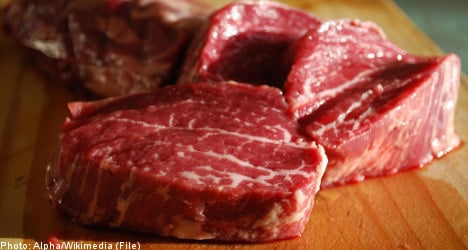The diets are based on the consumption of higher amounts of meat and fatty dairy products and prescribe restrictions on products such as potatoes and pasta.
The diets – especially the LCHF – have gained wide popularity in Sweden, Sveriges Radio (SR) reported, citing restaurateurs who are commonly asked to replace root vegetables with added meat.
But according to a report compiled by SR’s Ekot news programme, the cost to the climate is double that of the balanced diet advised by Sweden’s National Food Administration (Livsmedelsverket).
Furthermore, the report has revealed that many of the research studies supporting the nutrition and dietary benefits of the diets are bankrolled by the US meat industry.
Despite the popularity of the LCHF diet, there remains controversy in research circles over its nutritional benefits.
Debate over the LCHR diet has been raging in Sweden since 2005 after Dr. Annika Dahlqvist first prescribed the way of eating to help some of her diabetic patients lose weight and opened a blog to spread the word.
Dahlqvist soon became known as “the fat doctor” and her recommendations were brought to the attention of the National Board of Health and Welfare (Socialstyrelsen) by dieticians who claimed the diet didn’t fit standard weight loss guidelines.
Her employer instructed her to cease her controversial recommendations which were deemed to be in contravention of existing dietary guidelines. Dahlqvist instead elected to resign and focus her energies on lecturing.
Many of the studies to which Dahlqvist, and fellow LCHF advocates such as Andreas Eenfeldt, Ekot has found, are funded by food industry groups despite their insistence to the contrary.
Ekot’s report indicates that among the financiers of some of the studies referred to by the pair include the US-based National Cattlemen’s Association, dairy firm Swissmilk and other organisations linked to the now deceased Robert Atkins, who gave his name to a similar popular diet.
In a comment on the findings of the report on Tuesday, Annika Dahlqvist argued that her advice in based primarily on personal experience.
“Our LCHF recommendations are mainly based on basic knowledge of dietary influences on our biological functions. Our experience of this shows that we know that it works,” she wrote.
Andreas Eenfeldt conceded to Ekot that “of course it affects credibility in terms of who pays”, but cited several other studies supporting LCHF which he claimed had independent funding.
“The world is not black and white, and one can of course find economic interests of various scope within whichever movement is under inspection, as well as within all fields of research,” Eenfeldt wrote on his “Kostdoktorn” (literally: diet doctor) blog.



 Please whitelist us to continue reading.
Please whitelist us to continue reading.
Member comments